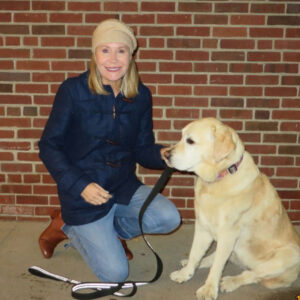What is it like to be a dog? What does your dog think? Perhaps at times you guess he says something like, “Oh come on, lady, just pour the kibble in my bowl and feed me.”
Well, if you’re Alexandra Horowitz, PhD, there’s no guessing. She has a pretty good idea what it’s like to be a pooch. The highly regarded researcher (who has two dogs and a cat of her own) strives to see the world from a dog’s umwelt. Umwelt?!

Dr. Horowitz says, “Umwelt is the worldview of an organism, human or non-human, what they perceive and what is meaningful to them.”
She is always sniffing out new insight on our four-legged friends as a professor at Barnard College in New York City, where she teaches and runs the Horowitz Dog Cognition Lab. She is the author of the best seller Inside of a Dog: What Dogs See, Smell and Know. Her newest book, Our Dogs, Ourselves: The Story of a Singular Bond hit store shelves this past September.

Related: 4 Books for Dog Lovers to Read While Self-Isolating
The popularity of her research and books shows how so many dog owners want to unlock their canine’s mind. Deciphering those mysteries is what drives Dr. Horowitz.
“I have a great interest in understanding the perspective of other creatures, non-humans or humans,” she says. “Non-human animals are especially interesting in that they can’t tell us what they know or think or understand in our language. We have to become great readers of their behavior.”

What she’s learned
Dr. Horowitz’s research has revealed much about how critical smell is to dogs, and how they play with people and other pooches.
“There’s a great pleasure in seeing dogs act — in seeing them try to figure out a puzzle, what we’re up to or what is hidden,” she says.
One of her favorite findings will make you think twice the next time you come home irritated to find your shoe torn up and your dog looking worried. Dr. Horowitz calls her analysis the guilty-look study. (Full name is Disambiguating the “guilty look”: salient prompts to a familiar dog behavior.)

“It tested a behavior that we, as people who live with dogs, see regularly,” she says. “It’s also the most misinterpreted: Some people read the conclusions as evidence that dogs don’t feel guilt. It’s not: It was evidence that the guilty look is prompted by us, angry.”
When you read Dr. Horowitz’s work you realize you may have to rethink what you think you know about dogs. But once you have her insight into the canine mind it just might improve your relationship with your own dog.
“My research and books provide people with a new interest in looking closely at what their dogs are actually doing and actually need,” Dr. Horowitz says. “I think that benefits both species.”
Top photograph: Philary/Getty Images
Read Next: Looking at ‘What Do Dogs Think?’ and the Future of Animal Companionship






